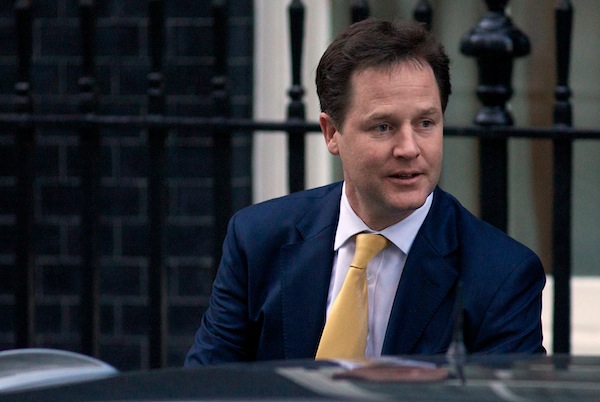Say what you will about Nick Clegg’s decision to take a different stance from the Prime Minister on Leveson, but the Deputy Prime Minister has this week effected another big change to the way Westminster government works. He has sent party members an email today explaining why he felt it was necessary to make a separate statement to David Cameron in the Commons on Thursday. The Lib Dem leader writes:
As you may have picked up, the Prime Minister and I disagreed; there is not yet an agreed ‘government line’. That’s in part why we had to make separate statements – a major departure from Parliamentary protocol, apparently.
I’m often non-plussed by the arcane rules of the House of Commons, most of which make no sense to ordinary human beings. To me it felt like the most natural thing in the world: two opinions, two statements.
Not everyone felt quite so comfortable with this, though. Peter Bone, ever the DPM’s adversary, tried to adjourn the House once Cameron had finished taking questions on his statement. I suspect Bone might, if he had to, try to adjourn a wedding to stop Clegg giving a best man’s speech, but on this occasion, his attempt failed. Others asked the Lib Dem leader about the implications for collective responsibility of having two separate statements from government ministers. But Clegg explained:
‘In a coalition government here can be no collective position that is not agreed collectively by all parts of that government. I know people in Westminster get terribly hot under the collar about some of these doctrines, but people out there in the country find it perfectly normal that in a government with two parties, there are issues on which those parties, because they are two parties, might not have the same view. We have to be relaxed and grown up about explaining that to the House and to the public, and then, as has been set out, seek to resolve those issues in the national interest.’
Although some Coffee Housers might, like Peter Bone, wish Clegg didn’t have the opportunity to make his own statement on issues like this, the Deputy Prime Minister does have a point. There isn’t yet an agreed government position, and from the Lib Dems’ point of view, the worst thing Clegg could do would be to sit on the front bench with a frozen face listening to the Prime Minister giving a statement that he is reported to disagree with. In a way, this sort of dual statement-making in response to a report rather than as part of the announcement of official government policy, is a sign of a more mature coalition, where the parties are honest about their differences.
But there is another aspect of government that Clegg is changing where it is much more difficult to argue that the Lib Dems are behaving with maturity. The party’s ongoing insistence that even its ministers will vote against their government’s agreed policy on the boundary changes as revenge for the failure of Lords reform is a unique constitutional event. The coalition is divided, not just over the policy, but over the effects of the rebellion. Senior Tories believe it will be a ‘nightmare’ for their ministers to sit down in departments the day after the boundaries vote with their Lib Dem counterparts and expect life to continue as it did before. They worry – and indeed some senior Lib Dems tell me that they hope this to be the case – that once the Rubicon of ministers voting against their own government without being sacked has been crossed, the Lib Dems will believe they can make dire threats about rebellions more often. Lib Dem ministers themselves are rather eerily relaxed about the prospect, shrugging their shoulders, and arguing that this is a one-off event, and that the Tories can defeat a policy from the backbenches only, while Lib Dems need their ministers if they are to win a vote.
It’s worth noting that senior Conservatives still hold doubts that this particular Rubicon will be crossed, though. One minister tells me he hopes for a ‘Black Swan moment’: an event that the party can’t yet foresee, but which will mean the Lib Dems end up voting for the changes. That’s not a view supported by the Libs, though, and if a black swan doesn’t swim into view before the vote takes place, Nick Clegg will change the way government works, but not, as he did this week, in a positive way.







Comments